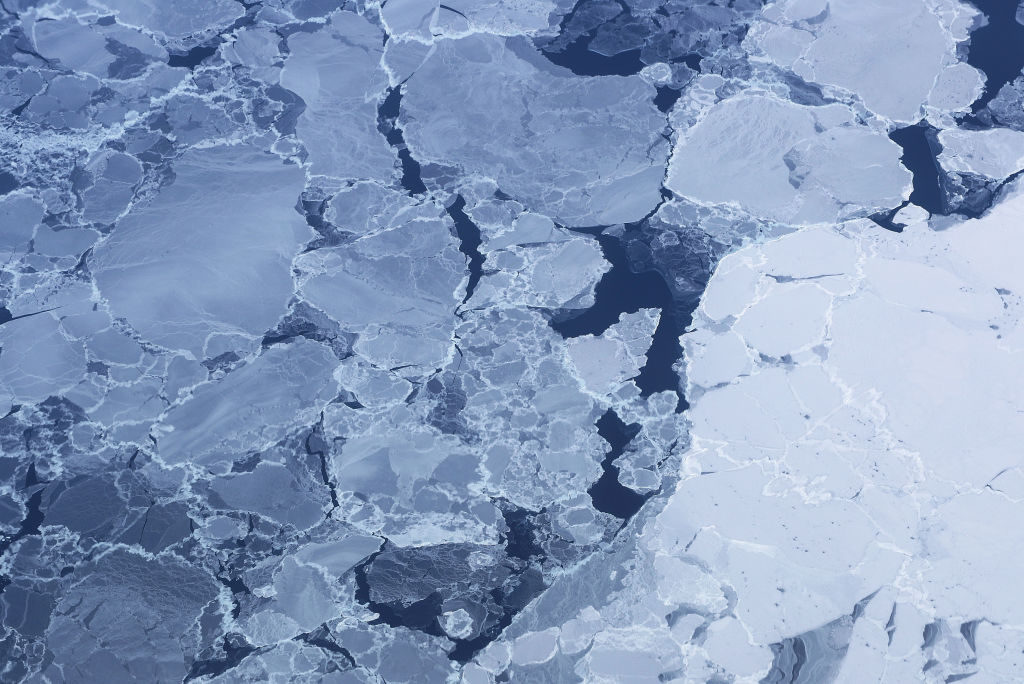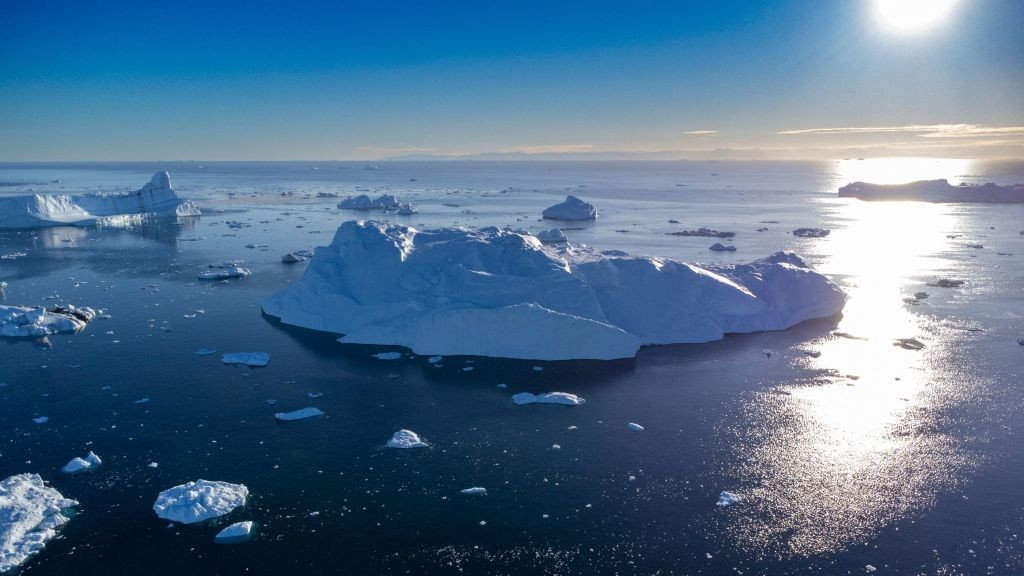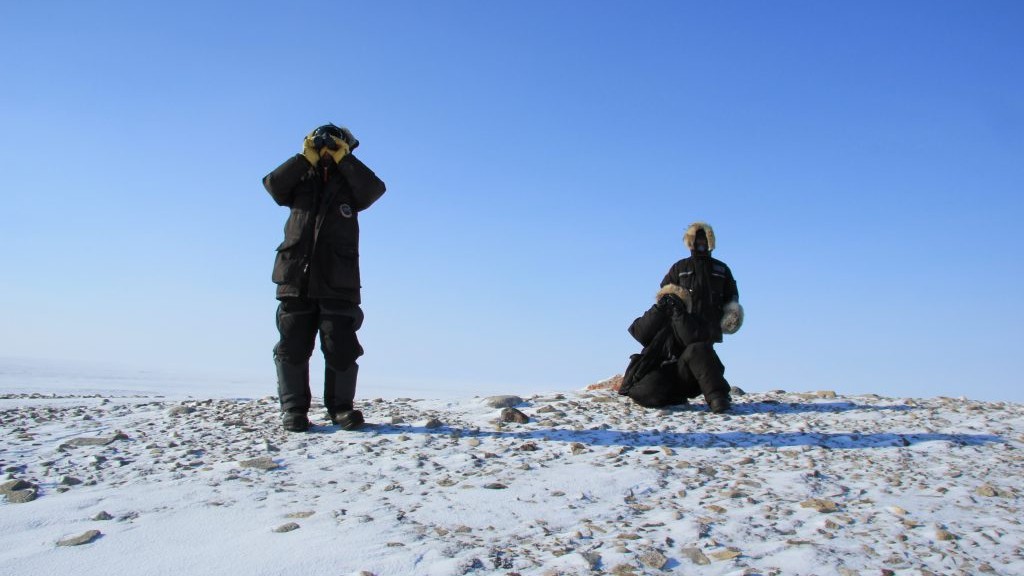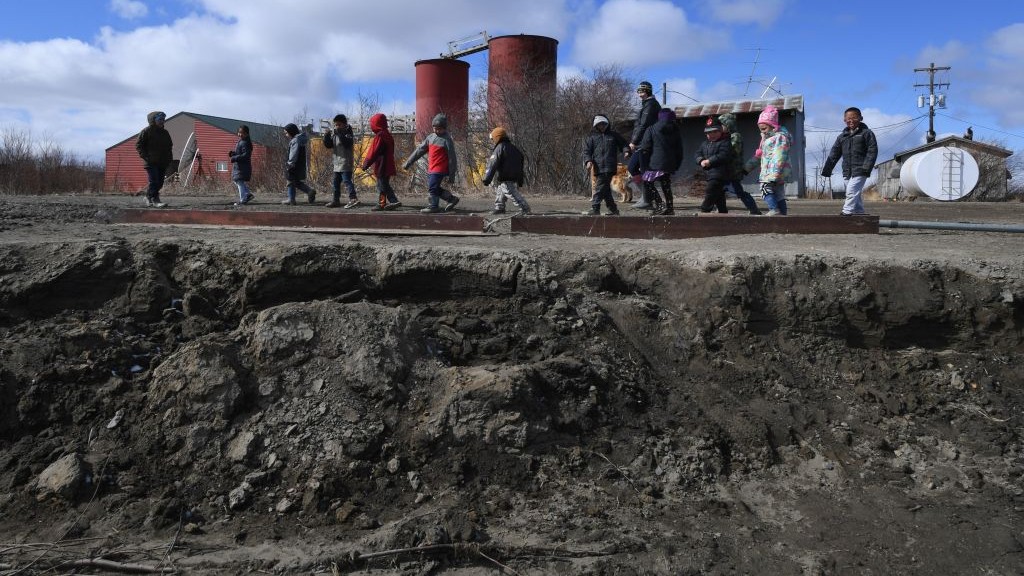
A file photo of sea ice near Ellesmere Island in Canada’s arctic archipelago.
(Mario Tama/Getty Images)
New modeling suggests that even under a low emissions scenario, the Arctic could experience ice-free Septembers as early as the 2030s.
“It is surprising and concerning, that even if we’re able to reduce emissions, we’re still projecting an ice-free Arctic,” Nathan Gillett, one of the Canadian co-authors of the study, told Eye on the Arctic.
“But if we don’t reduce emissions, we will see considerably worse impacts in the Arctic such as a longer ice-free season and much warmer temperatures.”
The new time period suggested by the research is about a decade earlier than other projections have previously indicated.
“Results indicate that the first sea ice-free September will occur as early as the 2030s–2050s irrespective of emission scenarios,” said the study, published Tuesday, in the journal Nature Communications.
“Extended occurrences of an ice-free Arctic in the early summer months are projected later in the century under higher emissions scenarios.”
“It is surprising and concerning, that even if we’re able to reduce emissions, we’re still projecting an ice-free Arctic,” Nathan Gillett, one of the Canadian co-authors of the study, told Eye on the Arctic.
“But if we don’t reduce emissions, we will see considerably worse impacts in the Arctic such as a longer ice-free season and much warmer temperatures.”
The new time period suggested by the research is about a decade earlier than other projections have previously indicated.
“Results indicate that the first sea ice-free September will occur as early as the 2030s–2050s irrespective of emission scenarios,” said the study, published Tuesday, in the journal Nature Communications.
“Extended occurrences of an ice-free Arctic in the early summer months are projected later in the century under higher emissions scenarios.”
 Icebergs floating in Disko Bay, Ilulissat, western Greenland.
Icebergs floating in Disko Bay, Ilulissat, western Greenland.(Odd Andersen/AFP via Getty Images)
To conduct the study, South Korean, Canadian, and German researchers examined sea ice data from different satellite information sets and climate models covering the period from 1979 to 2019.
“These results emphasize the profound impacts of greenhouse gas emissions on the Arctic, and demonstrate the importance of planning for and adapting to a seasonally ice-free Arctic in the near future,” the research paper said.
Possible changes irrespective of emission scenarios
The 2021 Intergovernmental Panel on Climate Change (IPCC) Report said the international community was close to reaching the warming threshold of 1.5 C.
It also warned that if action wasn’t taken to restrict greenhouse gas emissions immediately, and on a large scale, that limiting warming to even 2 C could be beyond reach with drastic implications for humanity, especially for the North where the report said ” The Arctic is likely to be practically sea ice-free in September at least once before 2050.”
However, authors of the paper published Tuesday said their modeling suggests this is an underestimation.
 Hunters from the community of Cambridge Bay use binoculars to try to spot mukoxen on Victoria Island in Nunavut. Sea ice changes in the Arctic affect both the marine and land environment Arctic Indigenous peoples rely on for food and transportation.
Hunters from the community of Cambridge Bay use binoculars to try to spot mukoxen on Victoria Island in Nunavut. Sea ice changes in the Arctic affect both the marine and land environment Arctic Indigenous peoples rely on for food and transportation.(Eilís Quinn/Eye on the Arctic)
“Our observationally-constrained projections based on attribution results also suggest that we may experience an unprecedented ice-free Arctic climate in the next decade or two, irrespective of emission scenarios,” the study said.
This is something that would have profound impacts for the globe, as well as the people of the North, said Gillett, also a research scientist with Environment Climate Change Canada.
“Inuit depend on the ice for hunting and when the ice-free season is longer that’s going to disrupt those kinds of activities,” he said.
“An ice-free Arctic also means a faster rate of warming in the air above the Arctic, including Northern Canada, leading also to thawing permafrost and impacts on infrastructure, impacts on food systems.”

A 2019 file photo of schoolchildren walking beside severe erosion of the permafrost tundra next to their school in Napakiak, Alaska.
(Mark Ralston/AFP/ via Getty Images)
Gillett said the research findings are sobering but that he hopes the takeaway is about the importance of action.
“We don’t want the message to be that reducing emissions isn’t going to work,” he said.
“We need to adapt to these changes by reducing emissions to net zero rapidly so we can limit future climate change. And we can limit the warming compared to what would happen if we’re not able to reduce emissions.”
Growing alarm over rapid changes to cryosphere
The research published this week follows on the heels of British Antarctic Survey report last Friday saying Antarctic changes could become tipping points with global implications.
Also last week, the World Meteorological Organization called for cryosphere changes to be put at the top of the global agenda with greater international cooperation and data sharing in order to close knowledge gaps in the polar regions.
Links :
- Nature : Observationally-constrained projections of an ice-free Arctic even under a low emission scenario
- The Guardian : Too late now to save Arctic summer ice, climate scientists find
- CNN : The Arctic may be sea ice-free in summer by the 2030s, new study warns
- The NYTimes : Arctic Summer Could Be Practically Sea-Ice-Free by the 2030s
No comments:
Post a Comment